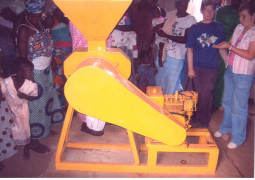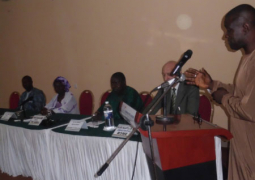In a bid to reduce the spread of malaria, particularly at the grassroots level, the ministry of Health and Social Welfare through the National Malaria Control Program with support from Global Fund recently concluded a two-week Indoor Residual Spraying (IRS) exercise in the Central River Region.
According to Baba Njie, Regional Health Director of CRR, the exercise was successfully conducted, and eleven districts were covered.
He said the exercise targeted 82, 664 houses, but they were able to spray 84, 600 out of the 48, 898 buildings. “This means more than 100 percent coverage has been achieved,” Mr. Njie said.
Mr Njie added that malaria is a life-threatening disease transmitted by the bite of a mosquito, with 1 million deaths and over 300 million reported cases each year globally, of which over 90 percent of the deaths occur in Africa.
He further noted that malaria kills 3000 African children daily, and this implies that an African child dies from malaria every 30 seconds.
According to Mr. Njie, the integrated and comprehensive implementation of these strategies throughout the country has contributed to a drastic reduction in malaria in The Gambia, and that admissions due to malaria have dropped by 74 percent and malaria attributable deaths have also reduced by 90 percent.
According to him, the IRS is the application of a long-acting chemical insecticide on the inner walls and roofs of dwelling houses, and animal shelters where possible, in order to kill adult mosquito vectors that land and rest on these surfaces; and reduce their life span so that they can no longer transmit the malaria parasite from one person to another.
He went on to explain that IRS was introduced in The Gambia in 2008, following the procurement of the insecticide by President Yahya Jammeh, who has always considered health as a top priority.
“Malaria is a public health problem in The Gambia, he went on, and that a huge effort is being made to eradicate the disease, through measures such as implementing the following effective interventions: the call for early diagnosis with prompt and effective treatment for malaria; free distribution of long lasting nets to the general population, and introduction of free malaria chemoprophylaxis and treatment for pregnant women for positive pregnancy outcomes.”
As a result of the interventions, he continued, the malaria burden in the country is reducing greatly.
He lamented that some of the challenges confronted by spray operators during the exercise included refusal and denial of entry to spray operators into some homes in some communities. However, overall the exercise was successful.
Ms Ndey Fatou Sallah, district supervisor who is also the public health officer at Janjanbureh Health Centre, and Lamin Drammeh team supervisor, commended their colleagues for a job well done. They further announced that, within Janjangbureh catchment area, they covered 36 communities.



